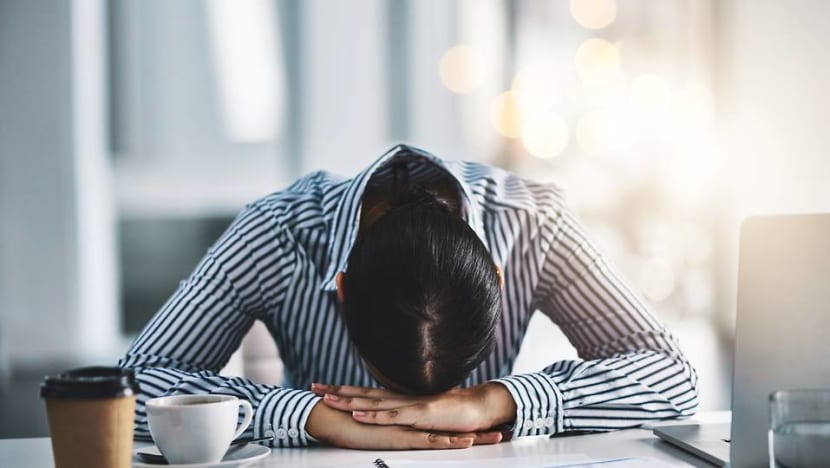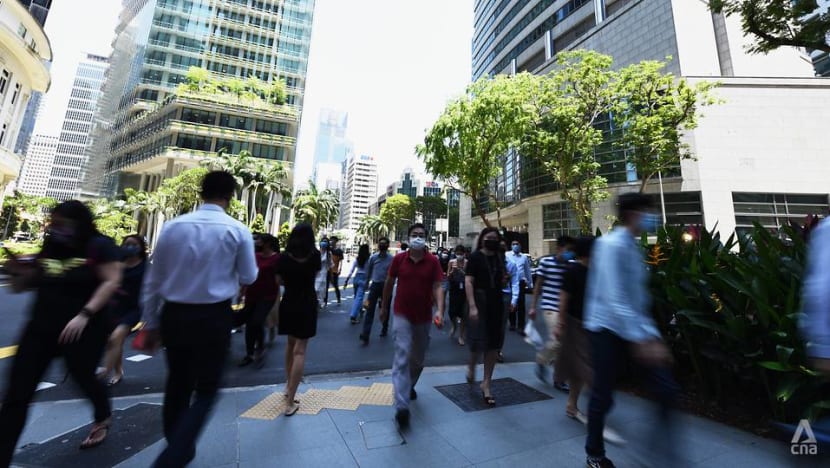Commentary: Why annual leave seems less restful without travel and what to do about it
How can we cultivate better forms of leisure? SUSS’ Dr Brandon Koh explains how to use your next leave to more fully recharge.

Since the pandemic, work has become all-consuming. (iStock/PeopleImages)
SINGAPORE: The announcement Singapore may allow leisure travel by year-end by co-chair of the multi-ministry task force and Health Minister Ong Ye Kung was warmly welcomed last week.
Many in Singapore have sorely missed holidaying overseas since the pandemic struck.
Singapore was ranked the most “vacation deprived” country in the world in Expedia’s 2021 edition of the annual ranking surveying 9,200 consumers in 16 markets.
Seven in 10 surveyed said they were either very or somewhat vacation deprived.
Travel has been so synonymous with leisure and rest that many employees struggled to clear annual leave in 2020, with employers adjusting leave policies to accommodate them.
READ: Commentary: Workers appreciate mental health days off after a crazy pandemic year
WHY IS TRAVEL RESTFUL?
For many, travel is particularly restful because it is a very different experience from their day-to-day lives. Overseas holidays usually depart from the mundane and are filled with novel experiences.
The rejuvenation we find in travelling also arises because almost all activities, be it work, leisure, or even chores are more pleasant uninterrupted.
When people can immerse themselves in a single task, like a long holiday overseas, they experience a state which famed psychologist Mihaly Csikszentmihalyi terms “flow”.
Recall those moments when time seem to fly by when you are fully engrossed in something. Under flow, people feel alert, strongly engaged and at the peak of their abilities. Feeling flow leaves people happy and fulfilled, even when the activities themselves are tiring.

In today’s highly connected era, many find themselves constantly tethered to work. Even if one puts aside all their devices off on a weekend, you worry about missing an urgent message from your boss or client. This makes it hard to switch off and soak in day-to-day leisure activities when clearing leave in Singapore.
Pre-pandemic leisure travel, however, provided a clear separation from work. People are forced to disconnect due to limited mobile and internet connectivity.
Even when connections were available, the social norm was to avoid contacting those on overseas vacations. Travellers too felt less pressure to respond.
The high travel expenses and sunk cost fallacy also ironically help people throw themselves in their vacation to savour every moment.
READ: From unlimited leave to four-day weeks, some firms are embracing more flexible time-off policies
CULTURE OF BUSYNESS HAS CHANGED OUR PERSPECTIVE OF LEISURE
Our modern “culture of busyness” has reshaped society’s view of leisure. These days, people often readily define work first, and treat leisure as the remaining time one is not working.
Interestingly, scholars have found that in the teaching of many early civilisations, people defined and pursued leisure foremost, and work was simply the absence of leisure. Dating back as early as ancient Greece, the philosophers Plato and Aristotle considered leisure the primary avenue where one cultivates the self and discover new knowledge.
Leisure was less defined by ease and self-indulgence, as is contemporarily so, but the pursuit of growth, self-examination and ultimately one’s meaning in life. Similar ideas can be seen in various cultures and religious teaching in historical times.
Today, many modern societies highly revere people with a strong work ethic. Busy people are seen as highly competent. Some people would even “humblebrag” about how occupied they are with work that they cannot take any leave.
READ: Commentary: Being a 'sell-out' was the best decision I made for my career
READ: Commentary: Call me a strawberry millennial, but being passionate doesn’t mean I’m willing to be exploited
In my research, I have found that such feelings of busyness lead to greater productivity and performance for people who do want to feel busy. However, those who feel pressured by society and guilty about not working may find themselves headed for burnout.
More importantly, people today are more likely to pursue self-development, growth and meaning in life through their careers, and neglect these important aspects during leisure.
The end result is that leisure gradually becomes reduced to a “time off work”, which promotes passive activities such as idling, watching television or shopping.

WHY IS TRAVEL A “GOOD” FORM OF LEISURE?
The process from pre- to post-travel provides a sense of progress and growth through planning, pursuing, and completing one’s goals and bucket lists.
Being physically present in the moment when we travel can be taxing - recall the stress of navigating, trouble communicating with locals, bugs on the hikes, and worries of pickpockets lurking in the crowds.
Yet, as the trip fades into the past, people usually recall a positive and abstract snapshot, sharing stories of the serene landscapes or how Paris is the “City of Love”.
Travel also provides many opportunities for self-development and discovery. We learn about other cultures which contributes to one’s sense of growth. In fact, multicultural experiences improve our creative abilities according to Dr Angela Leung’s research at the Singapore Management University.
READ: Commentary: Thailand’s Phuket sandbox can peel open travel despite limitations
READ: READ: Commentary: Targeted travel restrictions needed but careful not to undermine Changi Airport's connectivity
For others, travel can help complete a personal challenge, such as climbing a difficult mountain or braving their first bungee jump.
The dedicated time set aside during travel can also allow one to cultivate meaningful relationships with travel partners in connecting with each other.
HOW TO CULTIVATE BETTER LEISURE?
On the bright side, our inability to travel today provides a chance to reflect on how to cultivate a higher quality of everyday leisure. Depending on whether other countries lift their quarantine requirements and costs, we might not choose to travel even if Singapore unilaterally relaxes our restrictions.
It starts by being mindful about which leisure activities bring us happiness.
The American Time Use Survey estimates that Americans watch television 40 per cent of the time. Yet, they also report this as less enjoyable than other activities but say it is cheap, easy, and convenient. Many in Singapore can relate to this in the new normal.
Paradoxically, research finds that passive leisure activities are not restful and may even increase feelings of fatigue, apathy and lethargy.
READ: Commentary: Is this the end of movie theatres in Singapore as we know it?
READ: Commentary: The slow death of cable TV and why cutting the cord isn’t too painful
A 2018 study from the University of Buffalo also show that sedentary, passive leisure activities are frequently linked to eating and weight gain.
Leisure activities are more restful when they differ in nature from work-like activities, research generally indicates. A hobby such as pottery or woodworking can be restful, and even spark creativity if the experience vastly differs from someone’s paid day job.
I recommend that readers explore “deep play” - activities people pursue with intense focus and dedication. They are rewarding on their own, involving a degree of challenge but carry additional personal significance for the individual.
Quite often, they cultivate the same skills people develop from work, but are channelled towards a non-work activity. In this way, deep play also forms an integration between work and rest.
Mountaineering, for instance, demands careful planning, resource optimisation, and fostering camaraderie with one’s teammates among other skills.
The physically gruelling process tests the limits of one’s adaptivity and resilience. Yet, reaching the peak can be one of the most satisfying and psychologically restful experiences.
So find a sport or art that ignites your passion, and channel your free-time, skill and energy towards it during your leave days. You may discover that such deep play recharges your psychological reserves to perform at work – even if you don’t get to travel this year.
Dr Brandon Koh is an industrial-organisational psychologist and lecturer at the Singapore University of Social Sciences.














